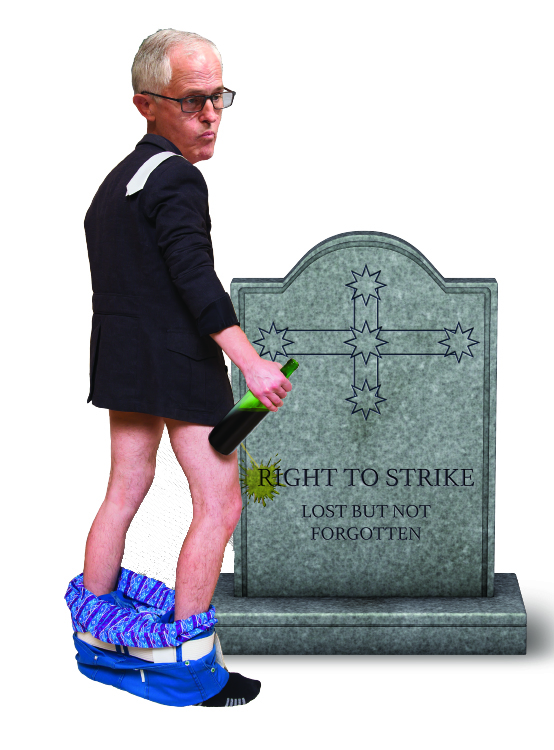Nearly dead: your right to strike

In late January the rail workers of New South Wales found out something very important on behalf of Australia’s 15 million workers: the right to strike is almost dead.
Striking is the process of withdrawing your labour (in whole or in part) for a period of time to show your employer the value of that labour. If you work in maintenance, construction or manufacturing – not much happens for very long without the workers there.
Striking reminds the bosses that “without our brains and muscle not a single wheel can turn”.
Your human right
The right to strike is a human right recognised by the United Nations and the International Labour Organisation – the global body for governments, employers and workers. Australia has signed up to the declarations from the UN and ILO that confirm this right, yet successive governments have violated our international pledges by railroading the right to strike down under.
Australian Federal Governments have curtailed our right to strike in two ways. Firstly, they say workers and our unions have to jump through what feels like a hundred different hoops to apply for protected industrial action. Secondly, they are cancelling our action even when we get legal tick-off for it.
DO I need protection
While in the United States there is just ‘striking’, in Australia there is ‘protected’ and ‘unprotected’ industrial action. Protected means that it complies with the requirements of the Fair Work Act and is ‘legal’ striking.Because more and more employers are terminating EBAs, it’s becoming harder to strike. If there’s no EBA, you can’t strike over it.
It’s important to jump through these hoops, because if you don’t and your action is ‘unprotected’, each worker that engages in the action can face $12,600 fines each and every day for violations. These can add up to hundreds of thousands of dollars for individual workers.
Union officials who support workers to take strike action that is unprotected face even bigger fines, which can reach the millions. Thanks to a recent court decision, union officials have to pay these fines themselves, even if they didn’t organise the action themselves. Even company directors don’t face this level of corporate accountability!
Cancelled: Your human right
Let’s say you jump through the hoops and get the green light for your industrial action to be ‘protected’ – congratulations. But now, there’s all sorts of ways the bosses and crooked governments can cancel that action and take away your right to strike.
Bosses and politicians can apply to Fair Work to have workers’ protected industrial action cancelled on a range of grounds. In New South Wales, the Liberal state government said the train strike would cause economic harm to the state and should be cancelled. Fair Work rubber-stamped this view and the train drivers were told if they did strike, they would be up for thousands in fines.
At the time of that decision, ACTU Secretary, Sally McManus, declared that the right to strike in Australia was ‘almost dead’.
"Rail workers followed every single rule and law, and still the Minister of the day can get an order to cancel bans on working excessive overtime.”
"Working people's wages in Australia are so stagnant because the rules are stacked in the favour of the employers," Ms McManus said.
But it gets worse, Australian Paper recently cancelled the protected industrial action of AMWU members on the grounds of economic damage to just one company. Of course the workers’ strike will cause economic damage to the company – that’s the point! Thankfully, the AMWU managed to have the cancellation suspended and their members went back onto the grass protesting Australian Paper’s planned cuts to RDOs and grandfathering of wages.
What’s next for the right to strike?
ETU Victoria State Secretary, Troy Gray, says it’s time to change the rules to make the right to strike an accessible right for Australian workers again.
“What good is a right you can never use? And even when you jump through every hoop they’ve concocted to stop you: they can still cancel your industrial action? It feels like we’re living in a dictatorship.”
“Every single big advancement that’s been won for ordinary people; superannuation, Medicare, first-world living standards, health and safety at work, the right to bloody vote – was won through workers saying ‘enough’ and packing it in for the day.”
“When the rules say the bosses can compel us to work, no matter how bad it gets for the workers – we’ve lost our way as a society. The rules are broken.”
To strike you have to:
- Have your EBA expire
- Be in bargaining
- Only take action over EBA items
- You must provide your employer 3 days notice of your intended type of action
- At least 50% of employees on the roll of voters in the ballot voted
- More than 50% of those valid votes approve the industrial action
- The action must start within 30 days of the declaration of the results of the ballot
- You can’t strike over anything else (like safety, deaths on site, wage theft, discrimination against some workmates)
- You can’t strike for a pattern agreement or to secure industry rates
- You can’t strike in support of other workers